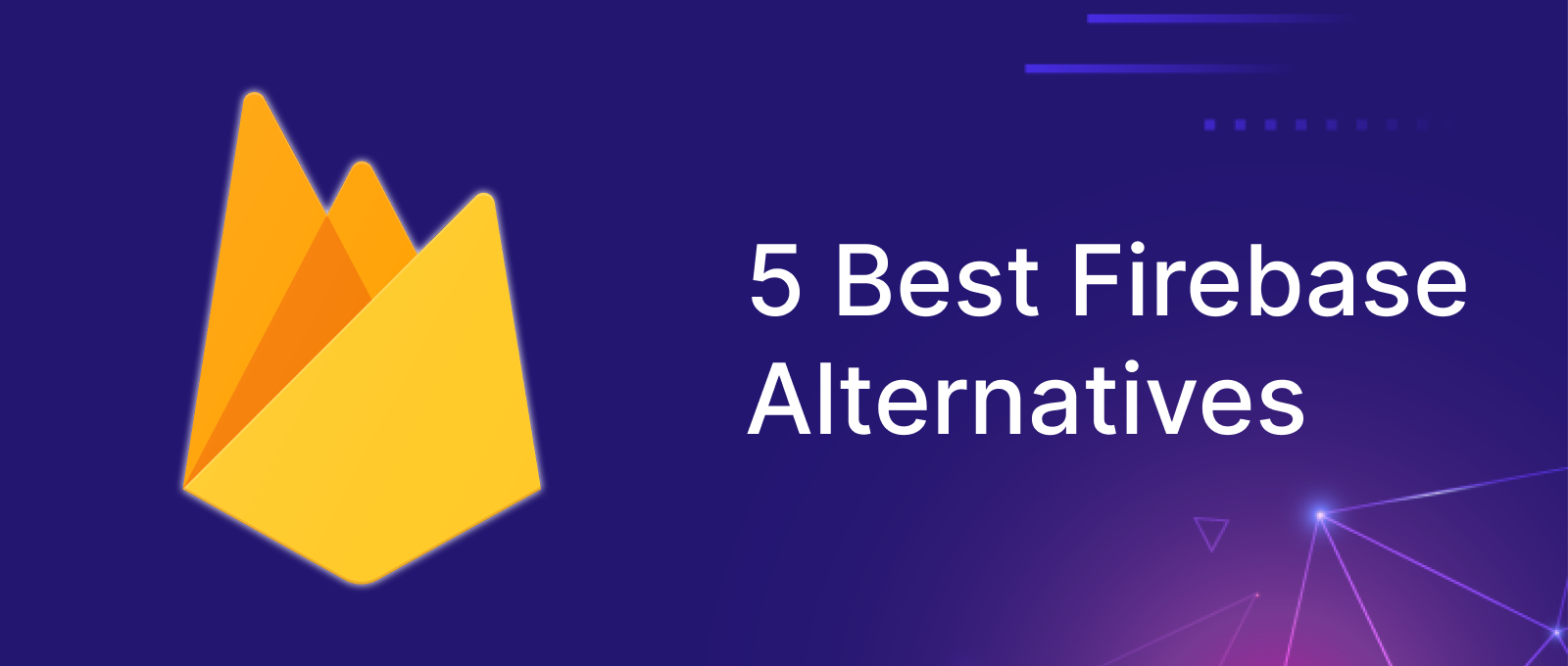Firebase is often a top choice for developers who want to create mobile and web apps without requiring extensive coding knowledge.
However, it’s important to note that Firebase is not an open-source platform, which means that you may have limited control over the development of your application.
Despite its many useful features, it’s essential to consider the potential limitations of using a closed-source platform like Firebase.
Fortunately, there are excellent Firebase alternatives that offer more customization and control. For instance, you can easily access more hosting options, work with multiple databases, and scale your app.
In this post, we will explore the disadvantages of using Firebase. We will also discuss why you might consider switching to a different solution. Finally, we will look at five of the best Firebase alternatives. Let’s get started!
What is Firebase?
Firebase is a collection of backend cloud computing services and mobile application development platforms offered by Google.
It provides hosting for databases, services, authentication, and integration for applications such as Android, iOS, JavaScript, Node.js, Java, Unity, PHP, and C++.
Developers can use Firebase to create and scale applications based on user demand.
Firebase aims to solve three main problems for developers:
- Build apps faster
- Release and monitor an app
- Engage users.
One of Firebase’s significant advantages is that Google supports it. It offers robustness and easy integration with Google Cloud services.
Drawbacks of Using Firebase for App Development
Firebase is widely used globally due to its wide range of features and easy integration with Google. Companies like Wattpad, Duolingo, and The New York Times use it.
Firebase can personalize any onboarding process, add different types of functionality, and grow user engagement.
However, for the wide range of advantages Firebase offers, many drawbacks make Firebase a less attractive option.
Let’s take a closer look at the drawbacks of using Firebase.
1. Limited iOS Support
Firebase, the popular mobile development platform, is widely known for its cross-platform capabilities, but it favors Android devices more than iOS.
That’s because Android is backed by Google, which makes the integration of Firebase with Android Studio a breeze. But the truth is that some of the features in Firebase only sometimes work seamlessly with iOS.
That being said, Test Lab recently announced beta support for some iOS test devices in early 2018.
2. Pricing
Firebase offers two different versions: the Spark Plan and the Blaze Plan. The Spark Plan is entirely free and is perfect for those who are just starting out with Firebase. On the other hand, the Blaze Plan is a ‘pay as you go’ option that is suitable for larger apps that require more resources.
However, the issue with the Blaze Plan is that it’s difficult to predict how much it will cost as your app’s traffic grows. As your app becomes more popular, Firebase can become more expensive. This means that the growth of your business might become both a blessing and a curse.
Even experienced Firebase integrators may find it challenging to answer clients’ questions about the future costs of using Firebase.
3. Synchronization issues
Firebase is a platform that emphasizes real-time synchronization, which can sometimes lead to data conflicts.
However, Firebase allows developers to configure conflict resolution strategies to ensure data consistency.
Additionally, users can receive update notifications instead of automatic adjustments for more control over their data updates.
4. Limited querying capabilities
Firebase’s Realtime Database lacks filtering capabilities and uses a JSON file format that structures the entire database as a single file, making it challenging to query complex data.
Additionally, it is impossible to query or list users or stored files. These limitations may hinder the development of more advanced applications, and developers may need to consider alternative solutions to overcome them.
5. Data migration problems
As your product expands, you may encounter challenges with data migration. Firebase’s reliance on JSON and limited use of SQL features can make database migration a headache. You can use SQL queries to obtain the information you need to move data in SQL databases.
However, Firebase does not allow this. As a result, migrating data in Firebase is more complex than in most SQL databases.
Why Switch to Firebase Alternatives?
While Firebase is a popular platform, it’s not as user-friendly or flexible as possible. Here are the main reasons you should consider using a Firebase alternative:
Hosting options: If you opt for Firebase, your application will be limited to the Google Cloud Platform. On the other hand, if you choose an open-source platform, you’ll have the flexibility to deploy your application on any cloud solution that suits your requirements.
Flexibility: Numerous alternatives to Firebase allow you to have complete control over your code and avoid the possibility of vendor lock-in.
Continuous improvement: Regular security reviews are conducted on an open-source framework as an alternative to Firebase. This framework provides the added benefit of accessing bug fixes and other improvements that can enhance the functionality of your application.
User-friendly: If you want a more intuitive and efficient way to code and develop apps, consider an open-source platform. Unlike Firebase, an open-source platform allows for faster code editing and customization.
Accessibility. There are free and publicly available alternatives to Firebase, which are open-source and can be downloaded.
Scalability. If you want to enhance your system’s flexibility, consider an open-source Firebase alternative. This can also provide more stability support, which can help your application grow.
If you’re working on an application, it would be advantageous to utilize a development platform or local environment. This would allow you to experiment with modifications without impacting your live environment.
5 Best Firebase Alternatives
1. Kinsta
Kinsta’s Platform as a Service (PaaS) is a great Firebase alternative if you’re looking for the best possible infrastructure for your application development.
With over 55,000 developers and digital entrepreneurs already on board, Kinsta offers 21 locations across 5 continents. It features the fastest Google C2 machines running on Google’s Premium Tier network.
Kinsta provides a solid infrastructure that’s fast to set up, thoroughly tested, reliable, and ready to scale. You can choose from 2 different build options, including the ability to automatically set up your container image or use your own custom Dockerfiles.
Kinsta supports your favorite frameworks, including PHP, Node.js, Ruby, Java, Python, GO, and Scala.
Their custom dashboard lets you easily track deployments, runtime, build time and bandwidth usage. Kinsta has created a new home for modern web applications that are both easy to use and highly functional.
You can connect your GitHub account and select a repository to deploy your application automatically or manually and build, scale, and run your processes separately.
Features
- Kinsta offers 24/7 global live chat support, ensuring customers can get help whenever needed.
- They use Google C2 machines and Premium Tier network, making it easy for users to scale their web applications as needed.
- Kinsta is integrated with Cloudflare, providing users with top-of-the-line firewall, DDoS protection, and SSL.
Pricing
At Kinsta, you can create and operate your apps as you want. Their pricing model is based on the resources you consume, meaning you only pay for what you use. With straightforward, transparent, and predictable pricing, it’s easy to understand and manage costs.
2. Parse
Parse is a highly sought-after framework for developing budget-friendly applications. The best part is that it is open-source and free of cost. It boasts easy implementation and usage, runs on any cloud, and allows local app testing and development using Node.
If you have your own server, you can also opt for self-hosting by downloading and running Parse. Moreover, the Parse community comprises dedicated developers who can provide expert support and swift troubleshooting.
Features
- Supports both MongoDB and PostgreSQL databases
- Offers a straightforward authentication process with social logins and email notifications without relying on third-party services
- Simplifies the creation of GraphQL APIs with minimal effort required from the user
Pricing
Free of cost.
3. Kuzzle
Kuzzle is a solution designed to help you improve your Time to Market (TTM) by up to 40%. With its scalable server, Kuzzle is perfect for apps experiencing rapid growth. It also offers a range of features, including multiprotocol API, administration console, geofencing, and fast search.
Kuzzle is highly flexible and can be used on-premises, on the intranet, and any cloud service, Linux or Docker infrastructure, and IoT hardware. This makes it a versatile solution tailored to your specific needs.
Features
- Subscribe to real-time queries for an efficient User Interface (UI) with Pub/Sub engine.
- Configure Kuzzle in cluster mode with two or more nodes for high availability and scalable deployment.
Pricing
If you’re interested in using the Kuzzle backend, you have two options: You can either download it for free or subscribe to the Kuzzle-hosted and managed platform. Paid plans for the latter start at $80 per month.
4. Back4App
Back4App is a platform that shares similarities with Parse but is marketed as a “low code” alternative to Firebase. The platform’s interface is designed like a spreadsheet, which makes it very user-friendly and easy to navigate.
One of the major benefits of Back4App is that it provides more database options than Firebase, giving users the flexibility to choose the best option for their needs.
Additionally, Back4App offers a fully managed service that includes 24/7 support, a CDN, and built-in caching for faster performance. With these features, users can enjoy a seamless experience while syncing and updating their data quickly and efficiently.
Features
- The platform uses GraphQL and Rest API to handle database operations seamlessly.
- Live querying functionality enables real-time synchronization for up-to-date data.
- The platform uses a relational database, making it easy to perform geo queries, aggregate functions, and query relational data.
Pricing
Back4app offers a free plan with 25,000 monthly requests, 250MB of data, and 1GB of file storage. If you require additional features, there are also paid plans available, starting at just $25 per month.
5. AWS Amplify
AWS Amplify is a Cloud platform service offered by Amazon that provides various tools that can be used separately or together. With Amplify Auth, you can quickly set up secure authentication, while AWS’s native authorization capabilities allow you to control who has access to your apps.
Moreover, AWS Amplify is ideal for artificial intelligence/machine learning and offers great support for onboarding flows, real-time collaboration, and targeted push notifications. One of the platform’s unique features is the ability to build your front-end UI visually using Figma integration for design-to-code.
Features
- The platform supports multiple frameworks, including JavaScript, Vue, Next.js, and Angular, as well as mobile platforms like iOS, Flutter, Android, and React Native.
- Over 175 services are available to help you improve user growth, DevOps practices and support new use cases.
- You can easily connect your app to new or existing AWS backends using this platform.
Pricing
You can use the free tier, which comes with 1000 build minutes per month and 5GB of storage. However, the free plan is valid for one year only, after which you must pay as you go.
Conclusion
If you’re looking to develop and launch your application, Firebase is a platform that can help you achieve your goals. However, as with any platform, it has its limitations.
One of Firebase’s drawbacks is that it is a closed-source platform. This means you don’t have control over your app’s source code, and your hosting options are limited.
Therefore, it’s worth considering exploring other alternatives to Firebase that offer more flexibility and control over your app development and hosting.


